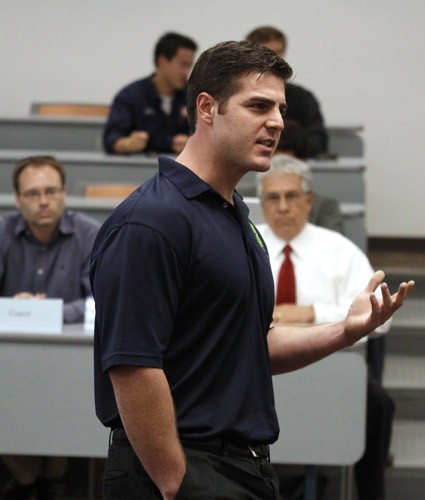The UA Gradate and Professional Student Council president resigned Wednesday.
David Talenfeld, GPSC president, recently came under fire from the council for a personal letter published in the Arizona Daily Wildcat that addressed new student fees. It was contrary to a joint statement the GPSC and the Associated Students of the University of Arizona had issued on the same day.
“”I hope you all agree that this is in everyone’s best interest,”” Talenfeld wrote in a prepared statement. “”Over the past few months my views have increasingly differed from those serving on the council, both in individual questions of policy and a broader ideological determinations about how our constituents may be best served. Presently we have arrived at an impasse; which will require me as president to either stray precariously from the dictates of my beliefs or become a stubborn impediment to the student advocacy process.””
Talenfeld arrived as his prepared statement was being read by a member of GPSC, and took the opportunity to further explain his positions.
“”I think that the solution to our state’s critical budget deficit must come in the form of compromise and on the back of all stakeholders,”” Talenfeld said. “”If students don’t pay for their education or their future, who will?””
The council had been notified by e-mail on Tuesday about Talenfeld’s resignation, but the announcement came as a surprise to those not on the council.
Former GPSC Vice President David Lopez-Negrete was sworn in as acting president at the end of the meeting.
“”I think it is unfortunate that this happened,”” Lopez-Negrete said. “”But it was necessary. I will now devote the rest of the term to following up on the projects we have already set forth.””
Lopez-Negrete mentioned the ongoing tuition and fee debates, the currently shelved student bill of rights and negotiating an end to “”drop fees”” for UA graduate students as the most important items still to be resolved before the current Graduate and Professional Student Council term ends.
“”We want to be able to get us through the end of this term and set things up for the next council,”” Lopez-Negrete said. “”Next year is an important phase.””
Council members were clearly pleased with Lopez-Negrete’s ascension, and several jumped to their feet as he was sworn in to his new office.
Internal turbulence could not stop the flow of business, however. The council also listened to a presentation from Frank Farias, the executive director of UofA Bookstores and entrepreneurial initiatives, about the proposed new fees for the Student Recreation Center.
“”The fee that has currently been proposed is much needed,”” said Farias. “”This new center is for the students, and so part of it has to be supported by the students.””
Farias also voiced his disapproval of the reduced fees proposed by the council in their joint statement with ASUA.
“”I can speak personally that these fees would only cover the costs of the old center, and would not address the increased costs associated with the recent expansion,”” Farias said.
Some council members spoke out against the mandatory fee.
“”Do you understand the gravity of these types of fees?”” asked Helena Morrison, a doctoral candidate in the College of Nursing. “”I believe that this proposal is premature. Wait a year. Get your finances in order and if the (Rec) Center has to suffer, then the need will be even more obvious and students will want to pay the fee for the services.””
Others spoke out against partnering the Student Recreation fee with the fee associated with Campus Health Service.
“”Nobody really, I think, believes the rationale behind bundling the fees,”” said Jim Collins, a non-degree seeking student. “”The (Rec) Center has been around for 20 years and there has never been any integration between student health and the (Rec) Center. Everybody kind of sees this as the combining of an unpopular fee with a necessary fee.””
Farias constantly stressed his belief that the Rec Center was a sound business opportunity, as well as potentially a critical recruitment tool.
“”I think the (Rec) Center can be far more than just an exclusive club,”” Farias said. “”I cannot change what has already happened, only what happens now and in the future. And I know what our plan is for the future.””









